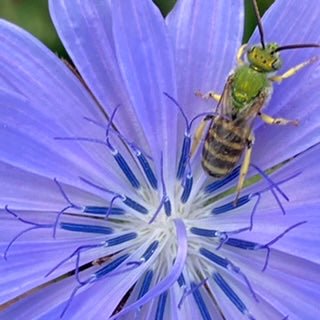|
September 27th 2022 passed quietly this year in the USA a few people like myself noticed it was the 60th anniversary of the book Silent Spring that is credited with starting the environmental movement. The author Rachel Carson spent 4 years researching her story of how DDT, a dangerous insecticide, accumulated in the environment and did great harm to birds of prey like the Bald Eagle and almost wiped them out.
Today 60 years later I believe we have the same urgent situation all over again happening in Mn and nearby states, only the class of chemicals neonicotinoids is less deadly so when it accumulates in pollinators, wild game birds and deer it’ sublethal meaning it does great harm but does not immediately kill the unintended victim.
This subtle but devastating effect has no doubt caused massive losses to our native pollinators and is partially to blame for the slow motion crash of the states commercial beekeeping industry that has lost 1/2 of it’s bee colonies and 75% of the honey crop since these chemicals became ubiquitous in the early 2000’s
The latest reality check is the new information published in a Star Tribune newspaper article Sept 11, 2022 titled "Nearly all Minnesota deer exposed to pesticides linked to pollinator die-off". Please read the disturbing article here.
The gist of the story is that Neonicotinoids (Neonics) that have dominated the field corn and soybean coated seed and now residential market since the late 1990's have been found in 94% of the deer herd samples collected across the state of MN.
Even whitetail deer sampled in the Boundary Waters Canoe Wilderness Area far from agriculture had high concentrations. Two thirds of the samples with neonics present had levels though to harm fawn survival. While this class of chemicals that is based on nicotine is safer than previous organophosphate insecticides they replaced, there are good reasons to consider far more restrictions then we currently have in place. .
For example neonics are the most commonly used residential insecticide sold as flea collars, soil drench, tree injections and countless lawn and garden products. I have no doubt that this is the route these insecticides took to find their way in to the so called pristine BWCA water system. Why not ban or severely restrict these products from cosmetic and residential use?
While the EPA and MN Ag Dept have laws and regulations surrounding the use and disposal of neonics for farm use they have no legal authority or regulation of the materials if used as a seed coating. As if these are suddenly benign chemicals in the environment when applied on the vast majority of field corn and soybean seeds. How laughable is this current oversight of a class of pesticides banned in Europe?
I am one small determined voice, but I love bees, pollinators, beekeeping, rural life and making honey. Anyone under the age of 20 years old in the USA has no memory of the sky filled with butterflies or the amazing diversity of pollinators we used to have. Most of them are gone, extinct and the monarch and commercial beekeepers are not far behind, I want the future to be inclusive for pollinators and beekeepers.
Please consider helping me get my message out to the state of MN and beyond by supporting our effort called Land For Bees that is about trying to restore pollinator habitat and educate landowners about their role in creating more habitat for bees and butterflies.
I am currently considering different ways to communicate my concerns to our state government and find fellow stake holders in my local Farm Bureau, Phesants Forever and and Farmers Union organizations that help develop farm policy.
MN
I am also thinking about organizing a protest at the MN state capital in June of 2023. It is hard to fit this in with the demands of running a bee farm. Thankfully I have 3 young beekeepers that are taking on more and more of the bee work, while I pursue my vision of changing the narrative around what could be done to save pollinators and the beekeeping industry in the USA.
I can use help writing, social media and networking as I try and build a coalition of beekeepers, nature lovers, hunters, birders and citizens that share my same concerns. Please contact me at Brian@amesfarm.com if you would like to help.
Alternatively you can participate in this effort by making an ongoing subscription based donation or purchase a raw honey subscription that is mailed out 3 times a year.
All funds from this subscription purchase or donations go to our Land For Bees initiative to replant our land for pollinators, you can read about it here
|
